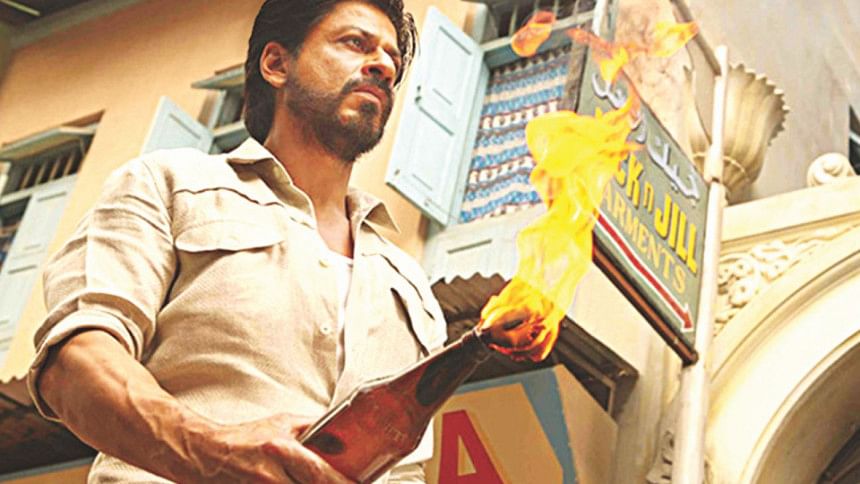Bollywood, please spare us your Muslim stereotyping

Films are powerful tools that shape ideas, attitudes and social norms. But as any art form, the message can be diffused or even distorted if it's not presented in the right way. In general, movies produced in Bollywood are not inspiring or stimulating — most of them defy logic and common sense. But sometimes they manage to touch a cord — unfortunately it could be the wrong cord. I must admit that once in a while I enjoy Bollywood entertainers, simply because they make no pretences about projecting "real life". Hence, when a friend invited me to watch Raees I accepted, looking forward to a fun evening of laughter and light chatter.
I will refrain from commenting on the quality of the film since it's beyond the purview of this column. What irked me is the stereotyped portrayal of the Muslim characters. The story centres on the life of a Robin Hood style mobster Raees played by Shah Rukh Khan. Interestingly, Raees, his sidekicks and rival dons are predominantly Muslim, creating the impression that the Indian underworld is entirely controlled by Muslims. Shah Rukh's surma-eyed, kurta-clad new avatar was charming and impressive. But his bloody, self-flagellating appearance as a mourner in a Moharram procession was too much for my palate. It evoked all kinds of negative connotations, especially now when Islam is projected by the media as a violent and "bloodthirsty" religion. As if that was not enough, we were subjected to a 10 minute (or what seemed like 10 minutes) brawl between Shah Rukh and a group of butchers in a bazaar with pieces of meat, and human and animal blood splattering all over the screen. This raw display of flying flesh and blood was a perfect gift for the RSS, who label Muslims as beef-eating savages and are advocating a ban on cow slaughter!
The movie could have picked up some traction with its diversion toward the Gujarat riots, but this thread was unfortunately sidetracked. On the contrary, by a strange twist of the plot, it was revealed that a Muslim underground don was involved in a major terrorist attack on the country, killing and maiming hundreds!
Bollywood's depiction of Muslim stereotypes is not new. In the late 60s and 70s, I remember watching Muslim socials (as they were then called) that came straight out of the studios and had no connection to reality. They were popular because they showcased a surreal world where the hero (usually a nawab's son) fell in love with the marble white (sang-e-marmar) hands of the burka-clad heroine whose face was revealed to him halfway through the film. After several twists and turns of mixed identities, the story ended happily. There was also the popular genre of the proverbial courtesan (always Muslim ) rescued by the hero after a three-hour long tamasha with conspiring brothel madams, devious pimps and "khandani" fathers trying to preserve their family honour by disavowing the smitten, prodigal son!
The question that continues to puzzle me is: Why are Muslims usually depicted as veiled beauties, dancing girls, nawabs, emperors, princesses, gangsters and terrorists! The Bombay film industry has given us many iconic directors, scriptwriters and actors who are Muslim. Yet it is hard to name a memorable movie that has "normal" Muslim characters with normal dreams and aspirations — like the boy or girl next door.
I grew up in Bangladesh in a middle class, liberal, Islamic environment and have not been exposed to the culture of courtesans and princes (if at all they existed during my time). Besides, in all my travels across India I have never encountered a gun toting Muslim gangster or a woman who comes to college with her face covered in a nikab. Then, why the fictitious representation of a stereotype that simply doesn't exist? Do followers of Islam not laugh, cry, love, hate like other people? Why must they be portrayed as debauched nawabs, oppressed women and violent goons?
So here is my appeal: Dear Bollywood scriptwriters, directors and actors — please try to depict Islam as a part of the whole and not "a thing apart". There is so much shared culture — architecture, food, music and literature — that connect Muslims and Hindus in the subcontinent. Navigating through the layers of history one may even ask: "Why was it necessary to divide this common legacy into segments known as nations?" While historians and politicians are struggling to find a definitive answer to this question, let the film industry refrain from accentuating the differences between the two communities. Yes, there are differences, as there must be even between and within families. But why not highlight the commonalities rather than flag the dissimilarities?
Bollywood movies are watched by millions both in India and abroad. Their popularity creates a moral obligation on the filmmakers to act responsibly and promote a positive view of any religion or segment of the population — especially now when extremist sentiments are creating social tensions. The Bombay film industry is known for its liberal and secular views and ideas and it has gifted us with some great movies. We would like to see more films that promote secular views.
The writer is a renowned Rabindra Sangeet exponent and a former employee of the World Bank.

 For all latest news, follow The Daily Star's Google News channel.
For all latest news, follow The Daily Star's Google News channel. 



Comments